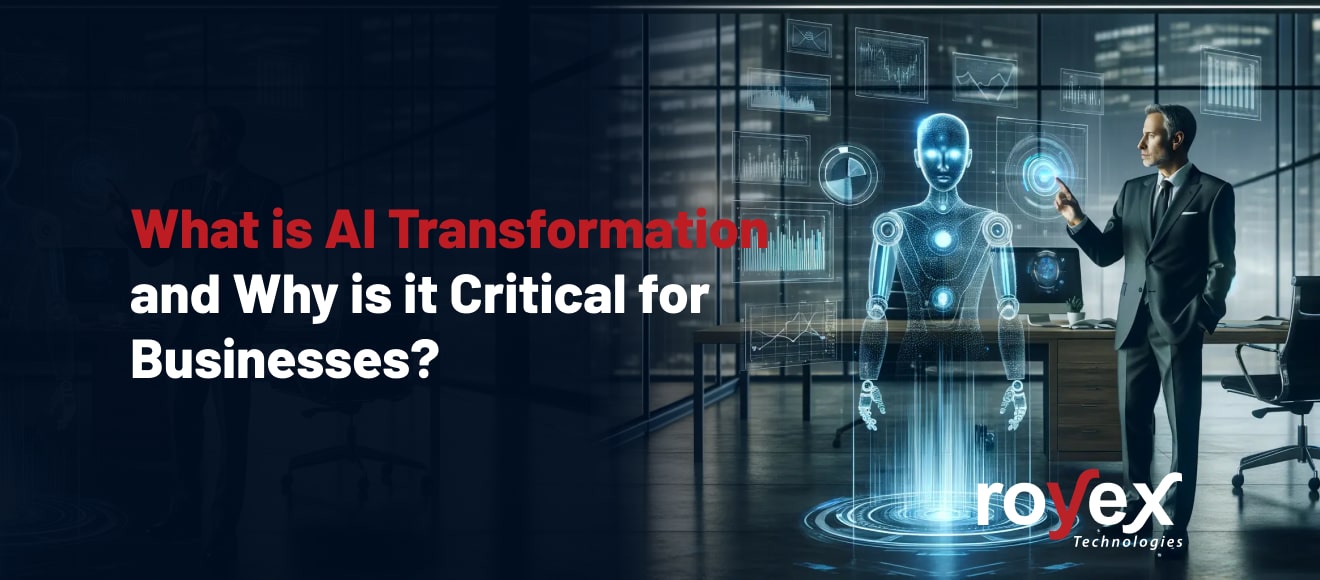
What is AI Transformation and Why is it Critical for Businesses?
Artificial intelligence (AI) has emerged not merely as a technological upgrade but as a transformative force that redefines how businesses operate, compete, and grow. This profound shift is known as AI transformation. It represents a strategic and holistic integration of AI into every facet of business operations, aimed at enhancing efficiency, agility, customer experience, and innovation. As we move further into an era defined by rapid change and high consumer expectations, AI transformation is not a luxury or a trend—it is a necessity.
Understanding AI Transformation

AI transformation goes beyond the adoption of a few smart tools or automating isolated tasks. It refers to the end-to-end reimagining of a business model powered by AI-driven insights, automation, and intelligence. This transformation includes changes in culture, processes, technologies, and strategies to leverage AI effectively.
Key elements of AI transformation include:
Strategic Integration: Aligning AI initiatives with business goals.
Data-Driven Decision Making: Leveraging big data and analytics.
Automation: Enhancing operational efficiency through intelligent automation.
Customer Experience: Personalizing interactions and predicting customer behavior.
Innovation Enablement: Unlocking new products, services, and revenue streams.
The Drivers Behind AI Transformation

Several factors are driving the widespread adoption of AI transformation:
Data Explosion: With the proliferation of digital devices and platforms, businesses are flooded with data. AI enables the extraction of actionable insights from this vast sea of information.
Customer Expectations: Modern consumers expect seamless, personalized experiences. AI allows businesses to anticipate needs and tailor services in real time.
Operational Efficiency: AI-driven automation streamlines workflows, reduces errors, and cuts costs.
Competitive Pressure: Companies embracing AI gain a significant edge over competitors. Those lagging risk obsolescence.
Scalability: AI allows businesses to scale operations and adapt quickly to market changes without a linear increase in resources.
The Core Components of AI Transformation

1. AI Strategy and Vision
The journey begins with a clear vision and strategy. Leadership must identify areas where AI can drive the most value and establish a roadmap for implementation.
2. Data Infrastructure
AI thrives on data. Building a robust data infrastructure that ensures quality, accessibility, and security is fundamental. This includes data lakes, cloud platforms, and data governance frameworks.
3. Talent and Skills
AI transformation requires new skills. Businesses must invest in training existing employees and hiring AI specialists such as data scientists, machine learning engineers, and AI ethicists.
4. Cultural Shift
AI impacts not just technology but organizational culture. Teams must be open to experimentation, continuous learning, and data-driven decision-making.
5. Ethics and Governance
Responsible AI use is critical. This means establishing ethical guidelines, ensuring transparency, and avoiding biases in AI models.
Business Functions Transformed by AI

Customer Support
AI-powered chatbots and virtual assistants like Eyaana can handle thousands of customer queries simultaneously, providing instant, 24/7 support. Advanced systems use natural language processing (NLP) to understand context and provide human-like responses.
Sales and Marketing
AI helps businesses analyze customer behavior, segment audiences, and personalize campaigns. Predictive analytics improves lead scoring, customer targeting, and campaign effectiveness.
Operations and Supply Chain
Machine learning algorithms forecast demand, optimize inventory, and manage logistics. AI also helps detect fraud, reduce waste, and improve overall efficiency.
HR and Talent Management
AI streamlines recruitment by scanning resumes and predicting candidate success. It also supports employee engagement through sentiment analysis and personalized learning paths.
Finance and Risk Management
AI automates routine tasks like invoice processing and expense management. More importantly, it enhances fraud detection, credit scoring, and risk assessment.
Real-World Examples of AI Transformation

Amazon: Uses AI for personalized recommendations, dynamic pricing, warehouse automation, and supply chain optimization.
Netflix: Leverages AI to personalize content recommendations, optimize streaming quality, and forecast demand.
Eyaana: An enterprise-grade AI customer support, sales, and marketing system that transforms how businesses interact with customers. It combines AI chat, human agents, intelligent ticketing, visual recognition, and multilingual support to deliver exceptional service across channels like WhatsApp, website, Instagram, and more.
Benefits of AI Transformation
Improved Efficiency: Automating routine tasks frees up human resources for strategic initiatives.
Enhanced Customer Experience: AI enables businesses to deliver timely, personalized, and consistent customer interactions.
Data-Driven Insights: Helps in identifying trends, predicting outcomes, and making informed decisions.
Increased Agility: Businesses can respond quickly to market changes and customer needs.
Innovation Catalyst: AI opens doors to new business models, products, and services.
Challenges in AI Transformation
While the potential is immense, AI transformation is not without challenges:
High Initial Investment: Infrastructure, talent, and tools require significant upfront costs.
Data Privacy and Security: Handling sensitive information demands stringent safeguards.
Skill Gaps: The demand for AI talent often exceeds supply.
Change Management: Resistance from employees and lack of understanding can hinder adoption.
Ethical Concerns: Ensuring fairness, transparency, and accountability in AI decisions.
Steps to Begin Your AI Transformation Journey

Start Small: Begin with pilot projects that demonstrate quick wins and scalability.
Invest in Data: Ensure your data is clean, accessible, and well-governed.
Build the Right Team: Combine internal talent with external experts.
Focus on Value: Prioritize AI initiatives that align with your strategic goals.
Measure and Iterate: Continuously monitor outcomes and refine your approach.
Why Businesses Can’t Afford to Wait
AI is not a future trend—it's a current imperative. Companies that delay AI transformation risk falling behind more agile, innovative competitors. Whether it’s delivering smarter customer service, optimizing operations, or unlocking new revenue streams, AI is the key to remaining relevant and competitive in the digital age.
AI transformation is reshaping the business world. It's more than a technological shift—it's a strategic reinvention. By embracing AI across all aspects of the organization, businesses can unlock extraordinary value, delight customers, and future-proof their operations.
We help organizations of all sizes kickstart and scale their AI transformation journeys with intelligent, integrated solutions designed for the modern digital ecosystem. The future is not just AI-powered—it's AI-transformed.




